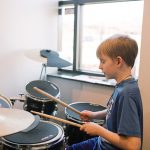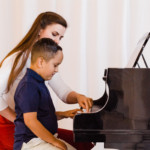Learn the Piano: A Gateway to Mastering Other Instruments
Learning a musical instrument is like unlocking a door to a vast world of creative expression, and the piano is often considered the master key. Known for its versatility and accessibility, the piano serves as an excellent starting point for anyone interested in music. But beyond its intrinsic beauty, the piano can act as a gateway to mastering other instruments. Here’s why you could learn the piano and lay a solid foundation for your musical journey.
1. Understanding Music Theory
The piano’s layout visually represents music theory. Each key corresponds to a specific note, and scales, chords, and intervals are laid out in a logical, easy-to-understand manner. This clarity helps budding musicians grasp:
- Note relationships: The distance between keys translates directly to intervals.
- Chords and harmony: Playing multiple notes simultaneously on the piano helps understand how harmonies work.
- Scales: Practicing scales on the piano makes it easier to understand tonal patterns applicable to all instruments.
Once you grasp these fundamentals on the piano, applying them to instruments like the guitar, violin, or saxophone becomes much more intuitive.
2. Improving Coordination
Playing the piano requires independent hand coordination, often referred to as “polyphonic playing.” Each hand may perform a different rhythm or melody, honing:
- Hand independence: Useful for instruments like the drums or any instrument requiring complex finger patterns.
- Rhythmic precision: Essential for all instruments, from wind to string.
This skill translates seamlessly to other instruments, making transitions smoother.
3. Building a Strong Sense of Pitch
With its broad range of notes, the piano helps develop a keen ear for pitch and tone. Playing melodies and harmonies trains your ability to:
- Recognize intervals.
- Match pitches—a skill critical for vocalists and string players.
- Identify and correct dissonance.
This auditory training is particularly beneficial for instruments like the violin or flute, where pitch accuracy isn’t as visually guided.
4. Developing Sight-Reading Skills
Reading sheet music for the piano involves interpreting both treble and bass clefs, giving learners a comprehensive understanding of written music. These sight-reading skills are invaluable when transitioning to:
- Guitar or bass: Familiarity with the bass clef is a head start.
- Orchestral instruments: Reading one clef feels simpler after mastering two.
5. Versatility Across Genres
The piano’s presence in diverse musical styles—from classical and jazz to pop and rock—exposes learners to various genres. This versatility encourages:
- Exploration of other instruments: Inspired by genres, learners might pick up drums for rock or a saxophone for jazz.
- Adaptability: Understanding different styles makes transitioning to new instruments smoother.
6. Fostering Discipline and Creativity
Piano practice involves consistent effort and fosters creative thinking. Mastering techniques, exploring improvisation, and expressing emotions through music cultivate qualities that are transferable to any instrument.
7. Accessible Entry Point
The piano’s intuitive design and instant feedback make it an ideal starting instrument. Beginners can:
- Play simple melodies early on.
- Gain confidence through quick wins.
This confidence often fuels the desire to explore other instruments.
Ready to Begin Your Musical Journey?
Whether you’re a parent deciding on your child’s first instrument or an adult exploring a new hobby, the piano offers unparalleled benefits. Its role as a foundational instrument equips learners with the skills, knowledge, and confidence to branch out into the vast world of music. Start with the piano, and you’ll find that the sky’s the limit!
Signing up for lessons is easy!
- Send us more information about your goals
- Register with us now!
- Give us a call at (402) 576-5792



